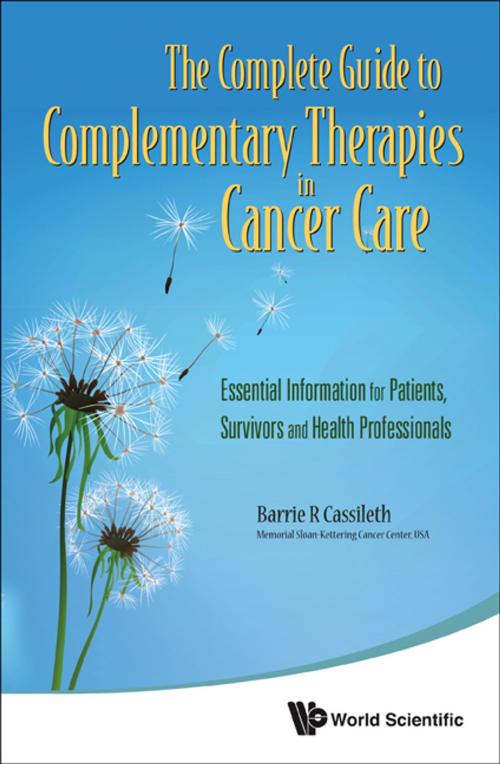The Complete Guide to Complementary Therapies in Cancer Care
Essential Information for Patients, Survivors and Health Professionals
Nonfiction, Health & Well Being, Medical, Specialties, Oncology, Alternative & Holistic Medicine, Alternative Medicine, Religion & Spirituality, New Age| Author: | Barrie R Cassileth PhD | ISBN: | 9789814383974 |
| Publisher: | World Scientific Publishing Company | Publication: | July 18, 2011 |
| Imprint: | WSPC | Language: | English |
| Author: | Barrie R Cassileth PhD |
| ISBN: | 9789814383974 |
| Publisher: | World Scientific Publishing Company |
| Publication: | July 18, 2011 |
| Imprint: | WSPC |
| Language: | English |
With recent clinical advances, millions of people survive many years after a cancer diagnosis. And while their physicians deliver conventional, evidence-based therapies to treat the cancer, sometimes the cancer patient and his or her symptoms are not treated with equal skill.
To manage their physical and emotional symptoms and promote health and well-being, most cancer patients and survivors use complementary therapies: Naturopathy, Ayurveda, herbalism, homeopathy, hypnosis, yoga, acupuncture, music therapy, macrobiotics, chelation therapy, colonics, hydrotherapy and many, many more. But … are they safe? Are they effective? What problems do they address? What are the risks? When can they help?
This unique and comprehensive book guides the way through the often confusing maze of complementary and alternative therapies promoted to cancer patients and survivors. The functions, benefits, backgrounds and risks are clearly presented. Learning when, if and how to use them provides medical professionals, cancer patients and survivors with the information they need to better control the symptoms and side effects of cancer and its treatment. Unfortunately, using some of these therapies without this expert guidance can lead to medical complications, or worse.
The Complete Guide to Complementary Therapies in Cancer Care is an invaluable resource in making educated health care decisions for managing life during and after cancer. Through the wise and informed use of these approaches, cancer patients — whether just-diagnosed, during treatment or throughout Survivership are better able to manage the physical and emotional stresses that accompany cancer, leading to symptom control and improved quality of life.
With recent clinical advances, millions of people survive many years after a cancer diagnosis. And while their physicians deliver conventional, evidence-based therapies to treat the cancer, sometimes the cancer patient and his or her symptoms are not treated with equal skill.
To manage their physical and emotional symptoms and promote health and well-being, most cancer patients and survivors use complementary therapies: Naturopathy, Ayurveda, herbalism, homeopathy, hypnosis, yoga, acupuncture, music therapy, macrobiotics, chelation therapy, colonics, hydrotherapy and many, many more. But … are they safe? Are they effective? What problems do they address? What are the risks? When can they help?
This unique and comprehensive book guides the way through the often confusing maze of complementary and alternative therapies promoted to cancer patients and survivors. The functions, benefits, backgrounds and risks are clearly presented. Learning when, if and how to use them provides medical professionals, cancer patients and survivors with the information they need to better control the symptoms and side effects of cancer and its treatment. Unfortunately, using some of these therapies without this expert guidance can lead to medical complications, or worse.
The Complete Guide to Complementary Therapies in Cancer Care is an invaluable resource in making educated health care decisions for managing life during and after cancer. Through the wise and informed use of these approaches, cancer patients — whether just-diagnosed, during treatment or throughout Survivership are better able to manage the physical and emotional stresses that accompany cancer, leading to symptom control and improved quality of life.















